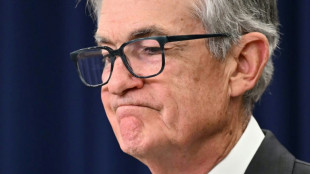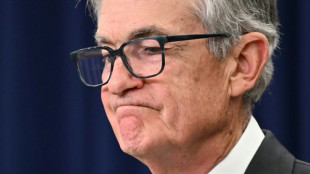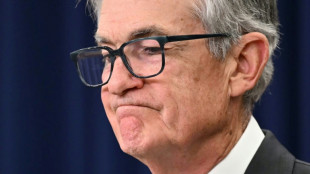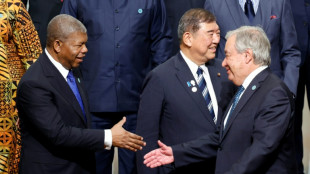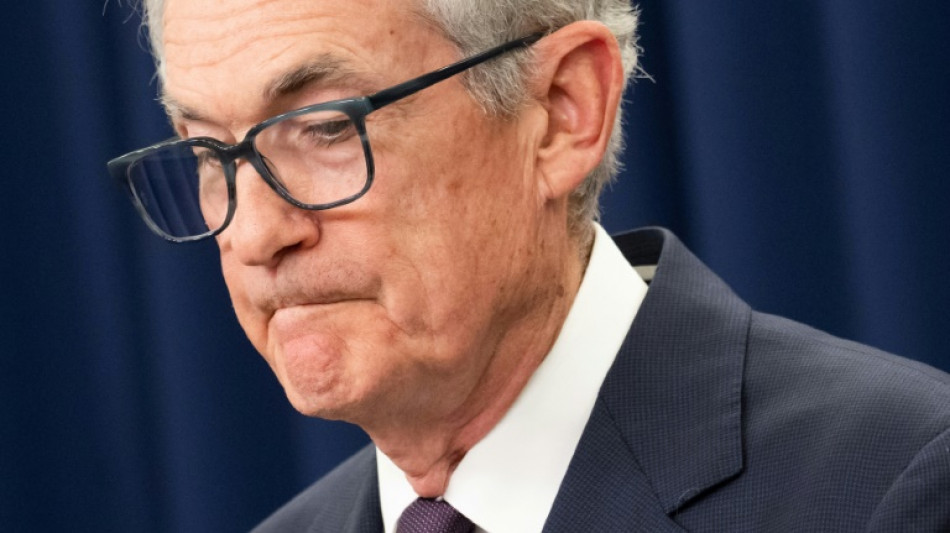
Stocks drop, oil gains as Mideast unrest fuels inflation fears

Major stock markets mostly fell and oil prices rose Thursday as the Israel-Iran conflict added to fears over a renewed spike to inflation.
The Federal Reserve on Wednesday warned that President Donald Trump's trade war could reignite US inflation and dampen economic growth as it kept its interest rates unchanged.
"Equity markets were in the red across Europe and most of Asia as investors were spooked by the escalating" Israel-Iran conflict, noted Russ Mould, investment director at AJ Bell.
"Oil prices have shot up in recent days and any disruptions to Middle East supplies could put them even higher and stoke inflation."
After gaining more than one percent in Asian trading hours, crude futures pulled back but remained higher compared with levels on Wednesday.
Analysts said there was a risk that Tehran could shut the Strait of Hormuz -- a key shipping lane through which an estimated fifth of global oil supply flows.
"We don't see it as a likely scenario at this time, but... I think everybody should be watching," American Petroleum Institute president Mike Sommers told Bloomberg.
Concerns over potential supply constraints boosted share prices of energy majors Thursday.
French oil and gas giant TotalEnergies topped the Paris stock market around midday with a gain of 2.4 percent. British energy group BP won 1.4 percent in London.
- Central banks -
More central banks were making interest rate decisions on Thursday.
The Swiss National Bank cut interest rates by a quarter point to zero percent.
The move is aimed at taming the Swiss franc, a safe haven that has soared against the dollar since Trump launched his tariff onslaught in April.
Norway's central bank made an unexpected cut to its rate, saying economic uncertainty was "greater than normal" due to escalating conflicts and trade tensions.
The Bank of England was widely expected to freeze borrowing costs in an announcement due 1100 GMT.
The dollar traded mixed against main rivals Thursday after the Fed kept rates unchanged for a fourth consecutive meeting despite Trump pressure to lower borrowing costs.
The Fed said in a statement that "uncertainty about the economic outlook has diminished but remains elevated".
The central bank cut its 2025 forecast for US economic growth and raised inflation and unemployment expectations -- in its first updated projections since Trump in April unveiled his levies on imports.
Fed chief Jerome Powell called the economy "still solid" but added that "increases in tariffs this year are likely to push up prices and weigh on economic activity".
Hong Kong led stock market losses in Asia on Thursday, closing down two percent, while Tokyo shed one percent.
Bangkok retreated as a political crisis involving Thailand's Prime Minister Paetongtarn Shinawatra put her government on the brink of collapse.
- Key figures at around 0945 GMT -
London - FTSE 100: DOWN 0.2 percent at 8,825.72 points
Paris - CAC 40: DOWN 0.6 percent at 7,610.30
Frankfurt - DAX: DOWN 0.3 percent at 23,247.24
Tokyo - Nikkei 225: DOWN 1.0 percent at 38,488.34 (close)
Hong Kong - Hang Seng Index: DOWN 2.0 percent at 23,237.74 (close)
Shanghai - Composite: DOWN 0.8 percent at 3,362.11 (close)
New York - Dow: DOWN 0.1 percent at 42,171.66 (close)
Brent North Sea Crude: UP 0.2 percent at $76.88 per barrel
West Texas Intermediate: UP 0.6 percent at $75.58 per barrel
Euro/dollar: DOWN at $1.1477 from $1.1485 on Wednesday
Pound/dollar: UNCHANGED at $1.3420
Dollar/yen: UP at 145.37 yen from 145.09 yen
Euro/pound: DOWN at 85.49 pence from 85.55 pence
M.Johnston--SMC


 London
London

 Manchester
Manchester
 Glasgow
Glasgow
 Dublin
Dublin
 Belfast
Belfast
 Washington
Washington
 Denver
Denver
 Atlanta
Atlanta
 Dallas
Dallas
 Houston Texas
Houston Texas
 New Orleans
New Orleans
 El Paso
El Paso
 Phoenix
Phoenix
 Los Angeles
Los Angeles
